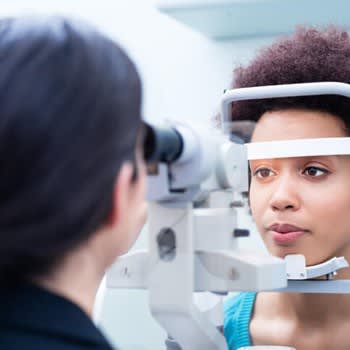Medicare Coverage for the Legally Blind (ABD)
- Legally blind people may qualify for Medicare even if they’re younger than 65. While Original Medicare covers limited vision benefits, Medicare Advantage plans and other types of private insurance coverage may offer more vision benefits that could be helpful to blind beneficiaries.
Most Medicare beneficiaries have qualified for their coverage by being at least 65 years old, but you may also be eligible for Medicare if you are under 65 and have a disability. One of the disabilities that can qualify you for Medicare coverage is low vision or blindness.
Have Medicare questions?
Talk to a licensed agent today to find a plan that fits your needs.
Can You Qualify for Medicare If You Are Legally Blind?
If you collect disability benefits from Social Security or the Railroad Retirement Board for 24 consecutive months, you can begin receiving Medicare coverage beginning with your 25th month.
The Social Security Administration determines eligibility for disability benefits and defines legally blind as:
“Vision that can’t be corrected to better than 20/200 in your better eye," or if your visual field is "20/200 in your better eye, or if your visual field is 20 degrees or less in your better eye for a period that lasted or is expected to last at least 12 months.”
What Does Medicare Cover for the Legally Blind?
Medicare benefits are the same whether you qualify based on age or disability. Anyone under the age of 65 who is legally blind and who qualifies for Medicare coverage will have access to the same benefits as those over the age of 65 who do not have a disability.
Original Medicare (Medicare Part A and Part B) does not include any benefits that are specific to the blind. Original Medicare does not cover white canes (long canes used by the blind), service dogs or any vision assistive equipment or low-vision devices.
If you are legally blind, however, you might qualify for a certain type of Medicare Advantage (Medicare Part C) plan called a Special Needs Plan (SNP). These plans are designed for people with specific health conditions or financial circumstances and include a set of benefits tailored to those needs. A Medicare Advantage Plan, and particularly a Special Needs Medicare Advantage Plan, may provide coverage for white canes and vision assistive equipment.
Does Medicare Offer Any Vision Coverage at All?
Original Medicare doesn’t typically cover routine vision care like exams, eyeglasses or contact lenses.
There are certain exceptions, however. Medicare will pay for corrective lenses following a cataract surgery to implant an intraocular lens. Eye exams for diabetic retinopathy can be covered once a year for beneficiaries with diabetes.
Medicare will also cover glaucoma tests annually for those considered to be at a high risk for the disease and may cover certain tests and treatment for those with age-related macular degeneration.
Select low-vision rehabilitation services may be covered as part of physical or occupational therapy. And treatment of eye injuries is typically covered when deemed medically necessary.
Routine vision care can be found in many Medicare Advantage plans, however. These plans, sold by private insurance companies, often include coverage for routine eye exams and corrective lenses.
Medicare Part D plans and Medicare Advantage plans that include prescription drug benefits may also provide coverage for medications used to treat eye diseases or injuries.
Some Medicare Advantage plans also provide coverage of non-emergency medical transportation. For example, a blind beneficiary can use public or private transportation or a ride-sharing service to get to a doctor’s appointment or pharmacy and have the cost of the trip covered by their plan.
Medicare Advantage plans can also provide coverage of home modifications designed to assist with aging that a blind person may utilize.
How Can the Legally Blind Get Help with Medicare?
Medicare provides benefit, eligibility and enrollment information in Braille, large print and audio files to better relay information to the vision impaired. You may request an alternative form of communication by sending an email to altformatrequest@cms.hhs.gov.
Medicare may also be reached at 1-800-MEDICARE (1-800-633-4227) or by fax at 1-844-530-3676.
Does Medicaid Cover the Aged, Blind, and Disabled?
A blind person may also qualify for health insurance benefits through Medicaid if they meet certain financial requirements. Medicaid benefits can vary by state, but often provides coverage of eye exams, eyeglasses and eye surgeries when medically necessary.
If you qualify for both Medicare and Medicaid, you may also qualify for a type of Medicare Advantage Special Needs Plan called a Dual-eligible Special Needs Plan (D-SNP) that can provide benefits more specific to your needs.
Resources for the Legally Blind and Vision Impaired
Below is a list of resources available to the legally blind or vision impaired regardless of whether or not get coverage for the care they need through Medicare or Medicaid.
- The National Federation of the Blind gives out free white canes to qualifying individuals.
- The Association of Blind Citizens provides funds to cover 50% of the cost of adaptive devices or software.
- Vision USA provides free eye care to the uninsured and low-income workers.
- EyeCare America provides referrals for disadvantaged individuals over the age of 65 who do not have access to an ophthalmologist they have seen in the past.
- Lighthouse Guild provides local referrals through a database of resources for people with low vision.
- The National Library Services for the Blind supplies the visually impaired with Braille and talking books that can be mailed to your home.





